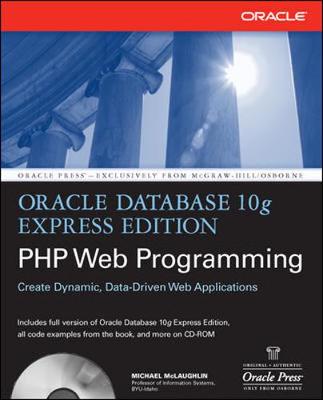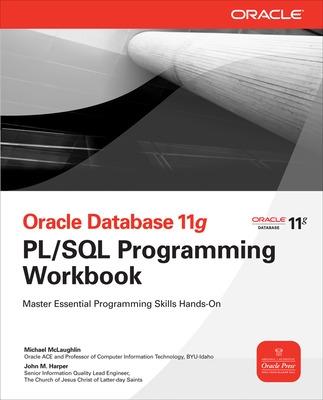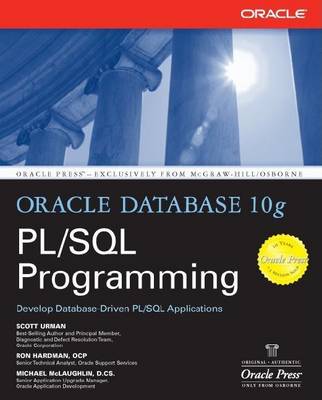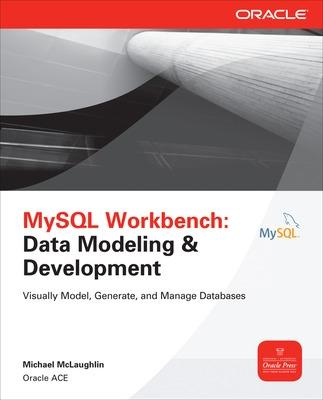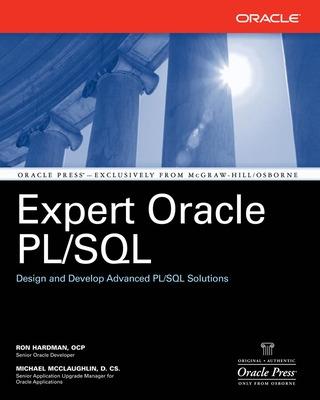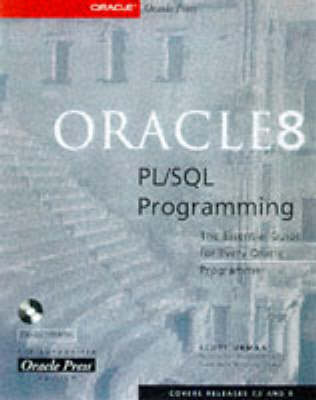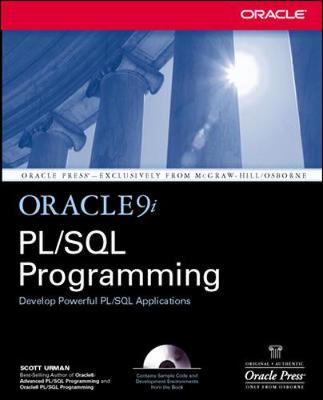Oracle Press
10 total works
Oracle Database 10g Express Edition PHP Web Programming
by Michael McLaughlin
The turnkey solution for Oracle's new FREE database--only from Oracle Press
This book and CD-ROM package contains everything you need to get started programming on Oracle Database 10g Express Edition. Learn, hands-on, how to develop enterprise applications in PHP which run on Oracle Database 10g Express Edition. The CD-ROM includes a full version of Oracle Database 10g Express Edition with all of the code and solutions from the book.
Oracle Database 11g PL/SQL Programming Workbook
by Michael McLaughlin and John Harper
Ramp Up Your PL/SQL Programming Skills
Master PL/SQL through the hands-on exercises, extensive examples, and real-world projects inside this Oracle Press guide. Filled with best practices, Oracle Database 11g PL/SQL Programming Workbook covers all the latest features and enhancements of the language. Mastery checks at the end of each chapter reinforce the material covered, and sample code from the book is available for download. Even experienced Oracle professionals will benefit from this practical resource.
- Understand the Oracle development architecture and the mechanics of connections
- Work with data types, structures, blocks, cursors, and PL/SQL semantics
- Write, deploy, and use functions, procedures, and packages
- Manage transactions and more
- Use dynamic SQL statements in real-world applications
- Support online transaction processing and data warehousing applications with external tables
- Find syntax samples and best practices to solve problems
- Write, deploy, and use object types
For a complete list of Oracle Press titles, visit www.OraclePressBooks.com
Oracle Database 10g PL/SQL Programming
by Scott Urman, Ron Hardman, and Michael McLaughlin
Publisher's Note: Products purchased from Third Party sellers are not guaranteed by the publisher for quality, authenticity, or access to any online entitlements included with the product.
The essential desktop reference for PL/SQL revised and expanded for Oracle Database 10g
Create dynamic client/server applications using PL/SQL and the comprehensive information contained in this authoritative volume. Expert Oracle insiders cover the features of PL/SQL, explain scripting semantics and syntax, and fully detail the PL/SQL functionality of Oracle Database 10g. You'll learn how to write powerful PL/SQL programs, interact with Oracle databases, perform complex calculations, and handle error conditions.
Master Application Development in a Mixed-Platform Environment
Build powerful database applications in a mixed environment using the detailed information in this Oracle Press guide. Oracle Database 11g & MySQL 5.6 Developer Handbook lays out programming strategies and best practices for seamlessly operating between the two platforms. Find out how to migrate databases, port SQL dialects, work with Oracle MySQL databases, and configure effective queries. Security, monitoring, and tuning techniques are also covered in this comprehensive volume.
Understand Oracle Database 11g and MySQL 5.6 architectureConvert databases between platforms and ensure transactional integrityCreate tables, sequences, indexes, views, and user accountsBuild and debug PL/SQL, SQL*Plus, SQL/PSM, and MySQL Monitor scriptsExecute complex queries and handle numeric and date mathematicsMerge data from source tables and set up virtual directories
Publisher's Note: Products purchased from Third Party sellers are not guaranteed by the publisher for quality, authenticity, or access to any online entitlements included with the product.
The only Oracle Press guide to MySQL Workbench explains how to design and model MySQL databases.
MySQL Workbench Data Modeling and Development helps developers learn how to effectively use this powerful product for database modeling, reverse engineering, and interaction with the database without writing SQL statements. MySQL Workbench is a graphical user interface that can be used to create and maintain MySQL databases without coding. The book covers the interface and explains how to accomplish each step by illustrating best practices visually.
Clear examples, instructions, and explanations reveal, in a single volume, the art of database modeling. This Oracle Press guide shows you how to get the tool to do what you want. Annotated screen shots demonstrate all interactions with the tool, and text explains the how, what, and why of each step.
Complete coverage
Installation and Configuration; Creating and Managing Connections; Data Modeling Concepts; Creating an ERD; Defining the Physical Schemata; Creating and Managing Tables; Creating and Managing Relationships; Creating and Managing Views; Creating and Managing Routines; Creating and Managing Routine Groups; Creating and Managing User & Groups; Creating and Managing SQL Scripts; Generating SQL Scripts; Forward Engineering a Data Model; Synchronize a Model with a Database; Reverse Engineering a Database; Managing Differences in the Data Catalog; Creating and Managing Model Notes; Editing Table Data; Editing Generated Scripts; Creating New Instances; Managing Import and Export; Managing Security; Managing Server Instances
Publisher's Note: Products purchased from Third Party sellers are not guaranteed by the publisher for quality, authenticity, or access to any online entitlements included with the product.
Create and debug next-generation, feature-rich PL/SQL applications
Push your PL/SQL programming skills to the next level with the extensive information contained in this volume. You’ll learn how to write dynamic PL/SQL programs, interface with Oracle databases, execute complex calculations, and handle error conditions using advanced techniques. Plus, you’ll get the latest on the PL/SQL Toolkit, Java integration, code threading, and performance optimizing. Oracle professionals Ron Hardman and Michael McLaughlin cover all the bases, providing real-world examples, undocumented tricks, syntax samples, and unique solutions for every topic.
- Compile high performance PL/SQL scripts using procedures, functions, packages and triggers
- Trap, trace, identify, and eliminate compile-time and runtime errors
- Manage error propagation, stacks, regular expressions, and metacharacters
- Exploit definer’s-rights and invoker’s-rights architectures
- Extend PL/SQL functionality using server-side and internal Java class libraries
- Build and run parallel PL/SQL program units using DBMS_JOB and DBMS_PIPE
- Exploit definer’s-rights and invoker’s-rights architectures
- Tune performance using statistics gathering, the PL/SQL optimizer, SQL Trace, DBMS_STATS, and TKPROF
- Use Oracle Text with PL/SQL Server Pages to perform theme/gist extraction, highlighting, stemming, fuzzy, and wildcard searching
- Administer server-side PL/SQL Toolkit web pages and PL/SQL Server Pages
- Secure, encrypt, and transmit data using DBMS_CRYPTO, UTL_COMPRESS, DBMS_DATAPUMP, and DBMS_FILE_TRANSFER
Design Feature-Rich PL/SQL Applications
Deliver dynamic, client/server PL/SQL applications with expert guidance from an Oracle programming professional. With full coverage of the latest features and tools, Oracle Database 11g PL/SQL Programming lays out each topic alongside detailed explanations, cut-and-paste syntax examples, and real-world case studies. Access and modify database information, construct powerful PL/SQL statements, execute effective queries, and deploy bulletproof security. You'll also learn how to implement C, C++, and Java procedures, Web-enable your database, cut development time, and optimize performance.
Create, debug, and manage Oracle-driven PL/SQL programsUse PL/SQL structures, delimiters, operators, variables, and statements
Identify and eliminate errors using PLSQL_WARNINGS and exception handlersWork with functions, procedures, packages, collections, and triggersDefine and deploy varray, nested table, and associative array data typesHandle external routines, object types, large objects, and secure files
Communicate between parallel sessions using DBMS_ALERT and DBMS_PIPE
Call external procedures through Oracle Net Services and PL/SQL wrappersIntegrate internal and server-side Java class libraries using Oracle JVMDevelop robust Web applications using PL/SQL Gateway and Web Toolkit
Oracle Database Ajax & PHP Web Application Development
by Lee Barney and Michael McLaughlin
Publisher's Note: Products purchased from Third Party sellers are not guaranteed by the publisher for quality, authenticity, or access to any online entitlements included with the product.
Design and Deploy Highly Responsive Data-Driven Web 2.0 Applications
Deliver next-generation user capabilities and client-side services in your Oracle-based Web applications by combining the powerful features of AJAX and PHP. Written by Web 2.0 programming experts, Oracle Database AJAX & PHP Web Application Development shows you how to design faster, lighter, more responsive Web applications while reducing code support and creation time. You'll learn how to develop modular AJAX and PHP code, add dynamically updated content, and implement click-to-edit and drag-and-drop functionality. You'll also get details on incorporating cutting-edge mashup, reporting, and communication features.
Build robust Web applications that utilize the latest AJAX, PHP, and modularity techniquesConstruct AJAX and PHP objects, controllers, iframes, and models Simplify programming with reusable modules, open-source libraries, and templatesOptimize scalability, availability, performance, and security Auto-refresh Web pages and execute XML calls using the HttpRequest object
Add HTML drill-down tables, DOM drag-and-drop, and click-to-edit features
Retrieve data from external sources using Remote Procedure Calls and Pear-based servicesSolve browser navigation button, bookmarking, and history tracking issuesAllow end users to customize Web pages using tracking, JSON, and mashupsFacilitate client-side communication with VOIP, IM, targeted reporting, and file sharing
The object-oriented features may be more difficult, but are still straightforward.
